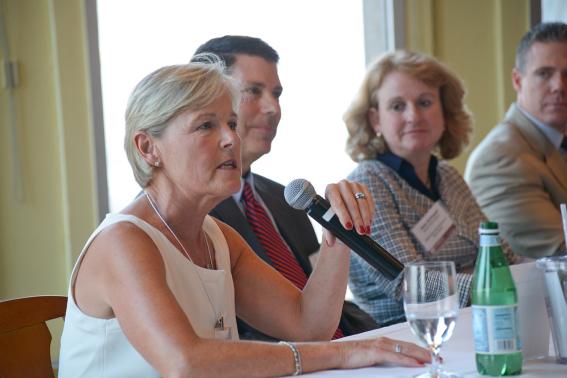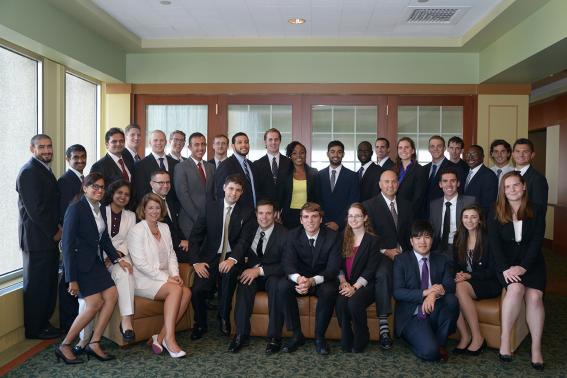First-Year MBA Students Immerse in “Boot Camp” Orientation
September 10, 2015

Coll was one of four participants in the culminating senior executive panel at the annual David C. O’Leary MBA Orientation Program for Isenberg’s first-year full-time MBA students. Also known as “MBA Bootcamp,” the experience from August 31-September 2 immersed students in a wealth of professional development activities. For the second year running, the event was funded by Isenberg MBA graduate David O’Leary ’81, a former Executive Vice President and Chief Administrative Officer with State Street. O’Leary helped conceive the event, attended its workshops, and moderated a panel of senior executives, who shared professional insights with the students.
For the retreat’s first 2 ½ days at the Leominster DoubleTree, the students met with trainers and other industry professionals who coached them in a variety of skills. They practiced elevator pitches and improvising. They learned about the latest career trends, sharpened their resumes, and got expert advice on behavioral interviewing and networking.
The students also explored their own professional opportunities at Isenberg through an introduction to the school’s MBA Fellowship program. At Isenberg, all full-time MBA students receive two-year fellowships that fully fund their degrees. In return, they work on business problems and strategic initiatives on behalf of the school.
Energizing Insights from Senior Executives
On Bootcamp’s final day, the students boarded a bus for the elegant UMass Club in Boston’s Financial District. At the club they networked with Isenberg alumni and heard senior executive panelists and their moderator, David O’Leary, recount key challenges in their own careers. The panelists explored how they had adapted at key pivot points in their careers and how as corporate leaders they approached business differently than they had as managers. They also shared hard-earned insights and advice, based on their own eclectic experiences.
“Leaders are about their teams and their people, not themselves,” insisted Bob Kaplan, Head of Operations at State Street. “It’s always about continuous improvement.” “You want a career path that creates the greatest number of options associated with the highest quality organizations,” advised State Street’s Jane Kirkland, who is her firm’s Senior Vice President of Global Services Americas.

To gain entry into an organization and to advance in it “you have to demonstrate that you understand the business,” observed Ted Dalton ’98 M.S., who has been the Boston Celtic’s Senior Vice President for Corporate Alliances and Community Relations since 2012. At the Celtics, that, he emphasized, entails a deep commitment to community involvement: “For the players, being a Celtic is a different mentality. They learn that we’re all stewards of the brand.”
David O’Leary concurred: “You have to understand the values of the organization and how they fit with your own,” remarked the Isenberg graduate and former senior executive, who periodically peppered the discussion with insights and questions of his own.
Students Respond
“The panelists and their stories really resonated,” remarked first-year MBA student Arty Lee. “It was fascinating to hear how the panelists got through some of the key challenges in their careers. I also appreciated the workshops; they helped us all to step into the program. “For me, the resume-building workshop was especially useful,” noted first-year MBA candidate Kayla Constantine. “It helped me to view my resume more critically, more strategically. I also appreciated that two of the four panelists were highly accomplished women. That was inspiring. And I really got to know my classmates over the three-day experience. It forced us to bond.”